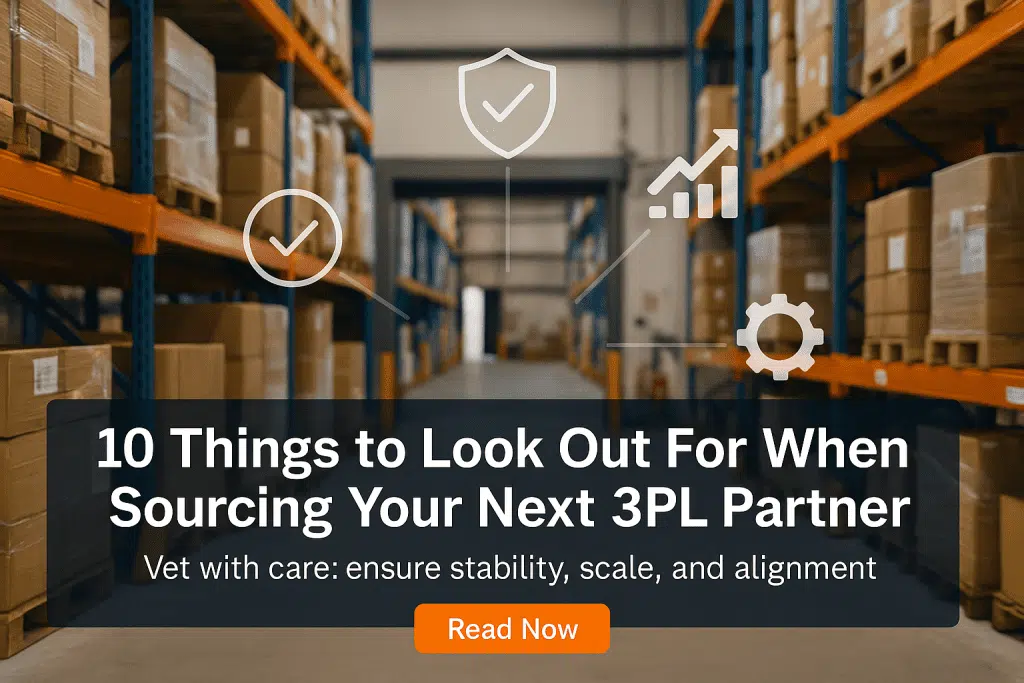Author: Jason Martin
Reviewed by: Ecommerce Operations Lead
Last updated: October 28, 2025
Executive TLDR
Pick a 3PL that is barcode first, scans at pick and pack, and posts a clear pack matrix.
Demand clean receiving with ASNs, booked docks, and a 1 to 3 day dock to stock target.
Centralize inventory in the Midwest to reach most buyers in 1 to 3 days by ground while rate shopping every label.
If you ship consumables, require lot and expiry capture and FEFO at pick.
Lock a 30 day onboarding plan with daily KPIs before you sign.
Want a short list tailored to your brand — Talk to an Expert
Table of contents
Why the right 3PL choice matters
The 10 things that separate strong partners
A 30 day onboarding plan
Daily KPIs to protect speed and margin
Why Product Fulfillment Solutions
FAQ
Why the right 3PL choice matters
Your fulfillment partner touches every order and every customer. The wrong fit creates delays, returns, and margin leaks. The right fit turns operations into a competitive edge. Here is how to choose with confidence.
The 10 things that separate strong partners
1) Clean receiving with ASNs and dock discipline
Look for a clear ASN template, booked dock times, and an exception lane for overages, shorts, and damages. Target 1 to 3 day dock to stock so inventory is sellable fast. If you need overflow or seasonal space, review warehousing and storage solutions.
2) Barcode first operations
Every unit should scan at pick and scan again at pack. Bins are labeled with large, high contrast IDs. This raises accuracy and lowers returns. See pick and pack services.
3) A simple packaging matrix that cuts DIM
Your 3PL should post the smallest safe mailer or carton by product family and print labels only after the final scan at pack. This reduces damages and billable weight. Learn more under discounted shipping rates.
4) Central hub with fast ground coverage
A Midwest location like Cincinnati reaches most customers in 1 to 3 days by ground. Start centralized, then add nodes only when data proves better cost and service. See 3PL fulfillment and ecommerce fulfillment services.
5) Proven small parcel optimization
Rate shop every label across national and regional carriers. Match the cheapest service to the promise day and measure billable vs actual weight daily.
6) Real time visibility
You and your partner should see the same facts: orders, inventory, exceptions, and SLAs. Shared dashboards stop email ping pong. Explore real time information.
7) Category fit for consumables
If you ship supplements, vitamins, cosmetics, or OTC, your 3PL must capture lot and expiry at receiving and enforce FEFO at pick. Review health and wellness fulfillment services.
8) Multi channel and retail readiness
Your partner should support DTC, marketplaces, and retail from one inventory pool with simple templates for unit, inner, carton, and pallet labels. For trading partners, connect through EDI solutions and connections and use FBA prep services when needed.
9) Kitting and value add that do not clog DTC
Kitting, relabel, and subscriptions should run off the main line with clear WIP caps. See kitting assembly services and subscription box fulfillment.
10) A written onboarding playbook
Before you sign, lock the steps, owners, dates, and KPIs for the first 30 days. Insist on a pilot, daily reporting, and clear cut off times.
A 30 day onboarding plan
Week 1 — Clean inputs
Build the product master for top SKUs: barcode, dimensions, weights, case and inner, hazard flags.
Save label templates and placement rules for unit, inner, carton, and pallet.
Draft the packaging matrix by product family.
Week 2 — Inbound discipline
Finalize ASN format and sample labels.
Book dock schedule and post a receiving checklist.
Set 1 to 3 day dock to stock and report daily.
Week 3 — Floor and outbound
Slot fast movers near pack and separate look alike SKUs.
Turn on scan at pick and a second scan at pack.
Publish one daily cut off and staff to clear the queue.
Week 4 — Pilot and tune
Run a live pilot on top movers.
Track order accuracy, on time ship rate, handling time, and billable vs actual weight.
Fix outliers, then roll to the full catalog.
Daily KPIs to protect speed and margin
Dock to stock time — goal 1 to 3 days
Order accuracy — goal 99.7 percent or better
On time ship rate — clear the queue by posted cut off
Billable vs actual weight — track DIM control and packaging
Cost per order — trend weekly and fix big movers fast
Why Product Fulfillment Solutions
Central U.S. hub in Cincinnati for 1 to 3 day ground to most buyers.
Barcode first receiving aligned to accurate ASNs for predictable dock to stock speed.
Pick and pack standards with right size packaging and labels that print after the final scan.
Small parcel optimization that rate shops every label.
FEFO and lot or expiry control built for consumables.
Retail and marketplace readiness through EDI solutions and connections and FBA prep services.
Shared dashboards for orders, inventory, and exceptions under real time information.
FAQ
How many 3PLs should I evaluate
Start with three. Use the 10 point list as your scorecard and require a written onboarding plan from each.
Can one inventory pool serve DTC, retail, and marketplaces
Yes. Standardize data and labels once, then route by promise and cost from a single pool.
Do I need multiple warehouses to be fast
Start centralized. Add nodes only when data proves savings and better service.
What accuracy should I expect
Aim for 99.7 percent or better with scan at pick and a second scan at pack.
How do I know if parcel costs are controlled
Watch billable vs actual weight daily and confirm rate shopping across national and regional carriers.

